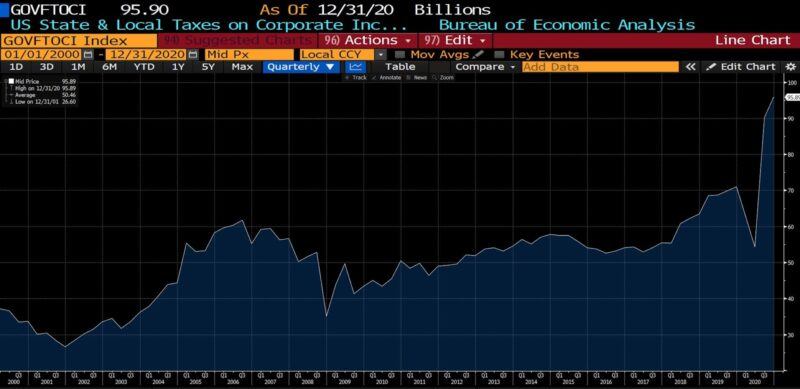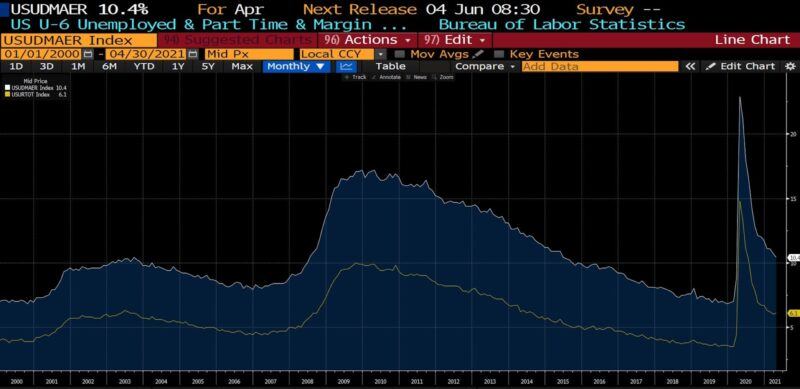The May 11 jobs report took many economic data watchers by surprise. Predictions of over one million new jobs in April 2020 were dashed, with only 266,000 created and the unemployment rate ticking up from 6.0 percent to 6.1 percent. It’s a bit difficult to understand why the incredible shortfall was surprising to many economists: Prices are rising, and for several months there have been widespread reports of labor shortages. Individuals respond to incentives, and the likely outcome of paying people more not to work than they earn working seems straightforward.
AIER Sound Money Project Director and Florida Atlantic University professor Will Luther predicted as much, and laid it out clearly in April 2020, 13 months ago. Since federal unemployment bonuses are guaranteed through September, one can expect the economic drag of underemployment to continue into the summer. Teachers unions have successfully lobbied to keep many school districts closed until the fall, also preventing many parents from returning to work through the end of the 2020-2021 school year at a minimum.
At the same time as work is being discouraged by government programs, the so-called infrastructure plan is rolling forward, bringing with it a wide swath of new taxes thanks to its $2 trillion price tag. The most recent version of the Biden tax plan seeks to target under 1 percent of all taxpayers: single filers earning (adjusted gross income) more than $452,000 per year and married couples earning more than $509,000 per year.
If it seems odd that the recent explosion in calls for inclusivity in every community and group in society somehow passed over a tiny sliver of Americans, it isn’t. Envy is now among the primary marketing tools for public policy buy-in. Americans, for three generations, have been blithely unaware of the wellsprings of prosperity.
But worse still are plans to increase corporate tax rates to levels exceeding those of some nations with notoriously anti-business policy histories. At Biden’s proposed rate of 28 percent, the U.S. would have higher corporate tax rates than China (25 percent), Italy (24 percent), and Greece (24 percent). France is planning to cut its corporate tax rates down to 25.8 percent, which will undercut the new U.S. rate.
In 2019, 99.4 percent of all C corporations had 500 or fewer employees: they will be hit by the Biden tax increase. (For the innumerate: employees numbering two hundred fifty, one hundred, seventeen, ten, two, and one are all less than 500.) Further, many of the owners of small companies set up with the subchapter S election––as pass-through entities––will be hit by higher income taxes.
BEA: US state and local taxes on corporate income (SAAR, 2000 – present)

(Source: Bloomberg Finance, LP)
It’s not that taxes merely deprive firms of the means to expand by reducing their capacity to create more jobs and invest in additional capital. Increases in government takings create distortions in the economy: to minimize or altogether avoid the impact of higher taxes, owners of firms alter their business models or operations. Entrepreneurs and established business managers will relocate, shift production, reduce headcount, and engage various other means to maximize revenue and reduce the rake. A global minimum tax on wealth, such as the one currently under discussion between U.S. Treasury Secretary Janet Yellen and other world leaders, will leave fewer places for producers to flee to.
It’s worth mentioning that the programs being proposed are, although undoubtedly what the Biden administration wants, an opening bid. There will be some horse trading. And reliably, Republicans won’t fight the increases in government spending, new and higher taxes, or increased U.S. debt so much as they will ensure that their constituencies receive some portion of the spoils. Higher prices, fewer market-created jobs; higher taxes, less private, commercial investment. More dependence, more redistribution, muted incentives, and worst of all, more policy precedence. Records are, after all, made to be broken––or at least invite attempts to do so.
BLS: U3 (yellow) and U6 (white) measures of labor force participation (2000 – present)

(Source: Bloomberg Finance, LP)
The more that individuals and firms are stripmined, with the fruit of their creativity and labor reallocated according to political whims, the less resilience families, communities, and the nation as a whole will have in the face of unanticipated adversity. Taxes blunt the forces of creative destruction, leaving great ideas to struggle for realization and ossifying commercial vibrancy.
Albert Einstein once said––paraphrased––that he couldn’t predict how World War III would be fought, but World War IV would be probably fought with sticks and stones. Covid-19 struck in a period with employment at record levels, GDP growing rapidly, and recently lowered taxes. The opportunistic, inexpedient policy responses to the Covid-19 pandemic ensure that when the next nasty bug––let’s call it “Covid-X”––or some other calamity reaches our shores, an economically weaker, poorer US will be waiting for it.
Source: AIER
Peter C. Earle is an economist and writer who joined AIER in 2018 and prior to that spent over 20 years as a trader and analyst in global financial markets on Wall Street.
His research focuses on financial markets, monetary issues, and economic history. He has been quoted in the Wall Street Journal, Reuters, NPR, and in numerous other publications.
Pete holds an MA in Applied Economics from American University, an MBA (Finance), and a BS in Engineering from the United States Military Academy at West Point. Follow him on Twitter.
Become a Patron!
Or support us at SubscribeStar
Donate cryptocurrency HERE
Subscribe to Activist Post for truth, peace, and freedom news. Follow us on Telegram, SoMee, HIVE, Flote, Minds, MeWe, Twitter, Gab, Ruqqus and What Really Happened.
Provide, Protect and Profit from what’s coming! Get a free issue of Counter Markets today.


Be the first to comment on "Setting the Table for Covid-X"